

Clinical embryologist: Job description. Clinical embryologists are scientists who work in fertility treatment and reproductive research.
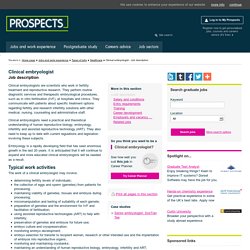
They perform routine diagnostic services and therapeutic embryological procedures, such as in vitro fertilisation (IVF), at hospitals and clinics. They communicate with patients about specific treatment options regarding fertility and research infertility solutions with other medical, nursing, counselling and administrative staff. Clinical embryologists need a practical and theoretical understanding of human reproductive biology, embryology, infertility and assisted reproductive technology (ART). They also need to keep up to date with current regulations and legislation involving these subjects. Embryology is a rapidly developing field that has seen enormous growth in the last 20 years. Typical work activities. Clinical scientist - tissue typing: job description.
Tissue typing clinical scientists are responsible for genetically matching patients with possible organ and stem cell (including bone marrow) donors.
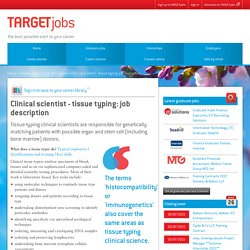
What does a tissue typer do? Typical employers | Qualifications and training | Key skills Clinical tissue typers analyse specimens of blood, tissues and so on via sophisticated computer-aided and detailed scientific testing procedures. Most of their work is laboratory based. Key tasks include: using molecular techniques to routinely tissue type patients and donors assigning donors and patients according to tissue type undertaking donor/patient sera screening to identify particular antibodies identifying specificity via specialised serological techniques isolating, measuring and cataloguing DNA samples isolating and preserving lymphocytes undertaking bone marrow transplant cellular assessments offering advice to clinicians about best donor/patient matches Other responsibilities include: Typical employers of tissue typing clinical scientists.
Epidemiologist job profile. Epidemiologists study the patterns, causes and effects of diseases in groups of people.
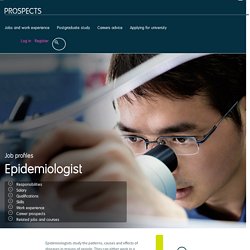
Healthcare scientist, histocompatibility and immunogenetics job profile. Careers in healthcare science. How I got a place on the NHS Scientist Training Programme 2017. Niamh Hall has just completed her BSc in Human Physiology at Leeds and successfully gained a place on this year’s NHS Scientist Training Programme.
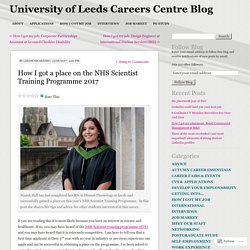
In this post she shares her tips and advice for other students interested in this career. If you are reading this it is most likely because you have an interest in science and healthcare. If so, you may have heard of the NHS Scientist training programme (STP) and you may have heard that it is extremely competitive. I am here to tell you that a first time applicant in their 3rd year with no year in industry or previous experience can apply and can be successful in obtaining a place on the programme.
I’ve been asked to write this article to give an insight into what my job will entail and to give a few hints and tips to anyone thinking of applying in the future. What is the STP? National School of Healthcare Science - STP recruitment. Applications for STP recruitment 2016 are now open Essential guidance Post information Specialisms Postgraduate training for the STP leads to a specifically commissioned and accredited master's degree and certification of achievement of work based training following one of 22 themed pathways: A full outline of specialisms can be found on the Health Careers website.
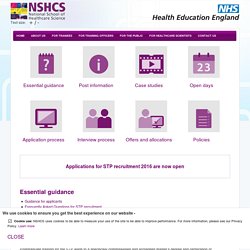
Please ensure you check the post location document on these webpages as not all specialisms will have posts available every year. STP locations by specialism v6 20.01.16. NHS Clinical Scientists. In the recent past, there have been as many as 21,000 applications for 220 to 230 STP positions, so competition for places is great.
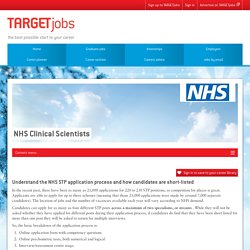
Applicants are able to apply for up to three schemes (meaning that those 21,000 applications were made by around 7,000 separate candidates). The location of jobs and the number of vacancies available each year will vary according to NHS demand. Candidates can apply for as many as four different STP posts across a maximum of two specialisms, or streams . While they will not be asked whether they have applied for different posts during their application process, if candidates do find that they have been short-listed for more than one post they will be asked to return for multiple interviews. So, the basic breakdown of the application process is: Online application form with competency questions Online psychometric tests, both numerical and logical Interview/assessment centre stage.
V2 STPApplicationFormQuestions. NHS Clinical Scientists. The NHS normally only allow Scientists Training Programme (STP) applications for a month at the beginning of the year and it can be survival of the fittest.
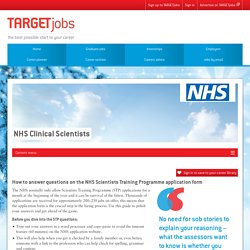
Thousands of applications are received for approximately 200–250 jobs on offer; this means that the application form is the crucial step in the hiring process. Use this guide to polish your answers and get ahead of the game. Before you dive into the STP questions: Type out your answers in a word processor and copy-paste to avoid the timeout feature (60 minutes) on the NHS application website.This will also help when you get it checked by a family member or, even better, someone with a link to the profession who can help check for spelling, grammar and content.Keep your answers concise, avoid unnecessary words and think to yourself – does this answer the question? You only have 200 words to play with and the website may measure by characters. How to approach: Remember that the NHS is all about patient care. NHS Clinical Scientists. The NHS STP interview process is sometimes referred to as an assessment centre, though this is a bit of a misnomer: no group tasks are involved and second round psychometric tests are uncommon.
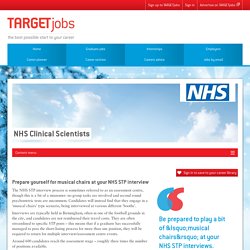
Candidates will instead find that they engage in a ‘musical chairs’ type scenario, being interviewed at various different ‘booths’. Interviews are typically held in Birmingham, often in one of the football grounds in the city, and candidates are not reimbursed their travel costs. They are often streamlined to specific STP posts – this means that if a graduate has successfully managed to pass the short-listing process for more than one position, they will be required to return for multiple interview/assessment centre events. Around 600 candidates reach the assessment stage – roughly three times the number of positions available.
NHS Clinical Scientists. V2 NHSCareers ScientistTrainingProgramme. Health Careers. Life science staff play a major role in the delivery of healthcare.
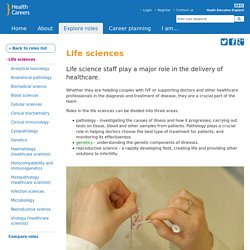
Getting into Academia. Are you considering an academic career?

It can be difficult to know where to start, so in this blog post our Careers Consultant, Becky Clark, gives her top tips on how to be successful in academia. Whether you are at undergraduate, Masters or doctoral (see definition below)* level you may be considering an academic career. If you are passionate about your subject, like, and are good at, research, love being within a university and want to share your knowledge with university students then an academic career may be for you. Some academics focus primarily on teaching, some focus solely on research. Many roles combine both.
You will need a good first degree with a 2:1 or 1st, usually a Masters and then a doctoral level qualification – a PhD, EngD, DPhil, DBA etc. Association of Clinical Scientists. HCPC - Homepage (Health and Care Professions Council) Dh_117982. 2903559-hee-careers-in-hcs-2015-final-for-website. Medical Device Industry Supplier Directory.